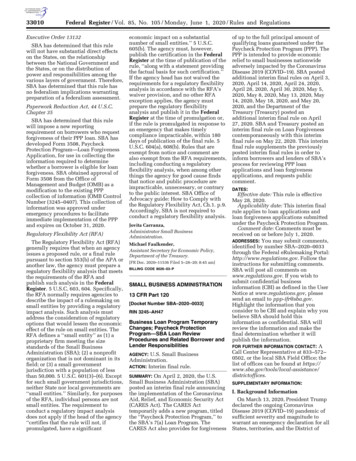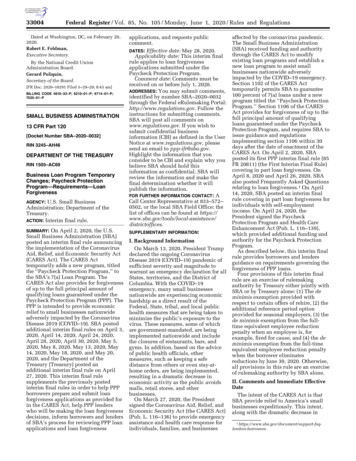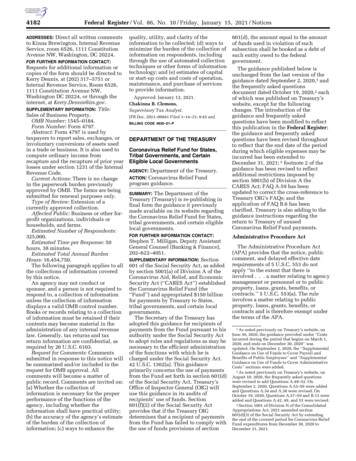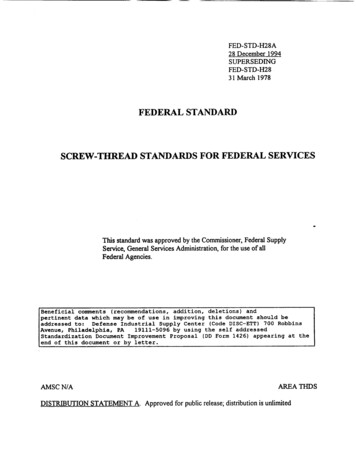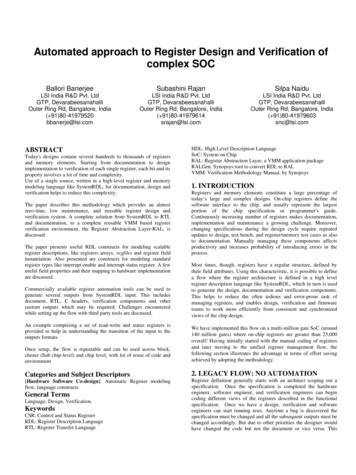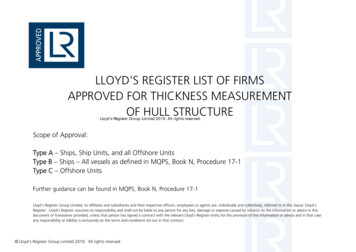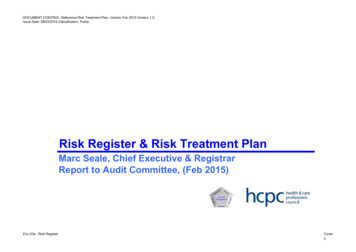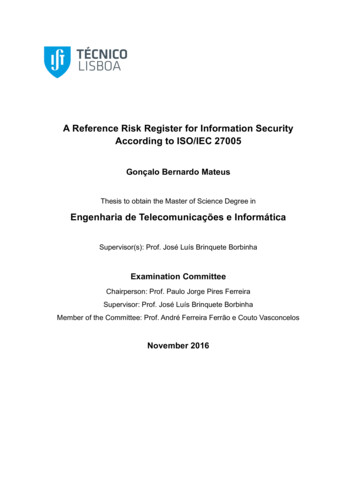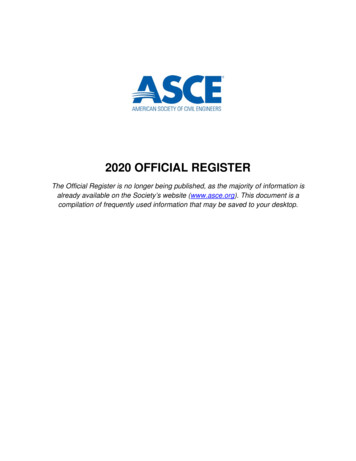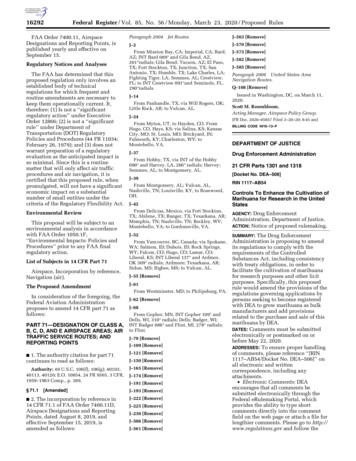
Transcription
16292Federal Register / Vol. 85, No. 56 / Monday, March 23, 2020 / Proposed RulesRegulatory Notices and AnalysesThe FAA has determined that thisproposed regulation only involves anestablished body of technicalregulations for which frequent androutine amendments are necessary tokeep them operationally current. It,therefore: (1) Is not a ‘‘significantregulatory action’’ under ExecutiveOrder 12866; (2) is not a ‘‘significantrule’’ under Department ofTransportation (DOT) RegulatoryPolicies and Procedures (44 FR 11034;February 26, 1979); and (3) does notwarrant preparation of a regulatoryevaluation as the anticipated impact isso minimal. Since this is a routinematter that will only affect air trafficprocedures and air navigation, it iscertified that this proposed rule, whenpromulgated, will not have a significanteconomic impact on a substantialnumber of small entities under thecriteria of the Regulatory Flexibility Act.Environmental ReviewThis proposal will be subject to anenvironmental analysis in accordancewith FAA Order 1050.1F,‘‘Environmental Impacts: Policies andProcedures’’ prior to any FAA finalregulatory action.List of Subjects in 14 CFR Part 71Airspace, Incorporation by reference,Navigation (air).J–563 [Remove]J–570 [Remove]J–14From Panhandle, TX; via Will Rogers, OK;Little Rock, AR; to Vulcan, AL.Issued in Washington, DC, on March 11,2020.Scott M. Rosenbloom,Acting Manager, Airspace Policy Group.J–24From Myton, UT, to Hayden, CO. FromHugo, CO, Hays, KS; via Salina, KS; KansasCity, MO; St. Louis, MO; Brickyard, IN;Falmouth, KY; Charleston, WV; toMontebello, VA.J–37From Hobby, TX, via INT of the Hobby090 and Harvey, LA, 266 radials; Harvey;Semmes, AL; to Montgomery, AL.J–39From Montgomery, AL; Vulcan, AL,Nashville, TN; Louisville, KY, to Rosewood,OH.J–42From Delicias, Mexico, via Fort Stockton,TX; Abilene, TX; Ranger, TX; Texarkana, AR;Memphis, TN; Nashville, TN; Beckley, WV;Montebello, VA; to Gordonsville, VA.J–52From Vancouver, BC, Canada; via Spokane,WA; Salmon, ID; Dubois, ID; Rock Springs,WY; Falcon, CO; Hugo, CO; Lamar, CO;Liberal, KS; INT Liberal 137 and Ardmor,OK 309 radials; Ardmore; Texarkana, AR;Sidon, MS; Bigbee, MS; to Vulcan, AL.J–55 [Remove]J–61From Westminster, MD; to Philipsburg, PA.The Proposed AmendmentIn consideration of the foregoing, theFederal Aviation Administrationproposes to amend 14 CFR part 71 asfollows:PART 71—DESIGNATION OF CLASS A,B, C, D, AND E AIRSPACE AREAS; AIRTRAFFIC SERVICE ROUTES; ANDREPORTING POINTSJ–62 [Remove]J–68From Gopher, MN, INT Gopher 109 andDells, WI, 310 radials; Dells; Badger, WI;INT Badger 086 and Flint, MI, 278 radials;to Flint.J–79 [Remove]J–109 [Remove]1. The authority citation for part 71continues to read as follows:J–121 [Remove]Authority: 49 U.S.C. 106(f), 106(g); 40103,40113, 40120; E.O. 10854, 24 FR 9565, 3 CFR,1959–1963 Comp., p. 389.J–165 [Remove]§ 71.1J–193 [Remove] jbell on DSKJLSW7X2PROD with PROPOSALSJet RoutesJ–2From Mission Bay, CA; Imperial, CA; Bard,AZ; INT Bard 089 and Gila Bend, AZ,261 radials; Gila Bend; Tucson, AZ; El Paso,TX; Fort Stockton, TX; Junction, TX; SanAntonio, TX; Humble, TX; Lake Charles, LA;Fighting Tiger, LA; Semmes, AL; Crestview,FL; to INT Crestview 091 and Seminole, FL,290 radials.Paragraph 2004FAA Order 7400.11, AirspaceDesignations and Reporting Points, ispublished yearly and effective onSeptember 15.[Amended]2. The incorporation by reference in14 CFR 71.1 of FAA Order 7400.11D,Airspace Designations and ReportingPoints, dated August 8, 2019, andeffective September 15, 2019, isamended as follows: VerDate Sep 11 201416:52 Mar 20, 2020Jkt 250001J–150 [Remove]J–174 [Remove]J–191 [Remove]J–222 [Remove]J–225 [Remove]J–230 [Remove]J–506 [Remove]J–561 [Remove]PO 00000Frm 00020Fmt 4702Sfmt 4702J–573 [Remove]J–582 [Remove]J–585 [Remove]Paragraph 2006 United States AreaNavigation Routes.Q–108 [Remove][FR Doc. 2020–05857 Filed 3–20–20; 8:45 am]BILLING CODE 4910–13–PDEPARTMENT OF JUSTICEDrug Enforcement Administration21 CFR Parts 1301 and 1318[Docket No. DEA–506]RIN 1117–AB54Controls To Enhance the Cultivation ofMarihuana for Research in the UnitedStatesDrug EnforcementAdministration, Department of Justice.ACTION: Notice of proposed rulemaking.AGENCY:The Drug EnforcementAdministration is proposing to amendits regulations to comply with therequirements of the ControlledSubstances Act, including consistencywith treaty obligations, in order tofacilitate the cultivation of marihuanafor research purposes and other licitpurposes. Specifically, this proposedrule would amend the provisions of theregulations governing applications bypersons seeking to become registeredwith DEA to grow marihuana as bulkmanufacturers and add provisionsrelated to the purchase and sale of thismarihuana by DEA.DATES: Comments must be submittedelectronically or postmarked on orbefore May 22, 2020.ADDRESSES: To ensure proper handlingof comments, please reference ‘‘[RIN1117–AB54/Docket No. DEA–506]’’ onall electronic and writtencorrespondence, including anyattachments. Electronic Comments: DEAencourages that all comments besubmitted electronically through theFederal eRulemaking Portal, whichprovides the ability to type shortcomments directly into the commentfield on the web page or attach a file forlengthier comments. Please go to http://www.regulations.gov and follow theSUMMARY:E:\FR\FM\23MRP1.SGM23MRP1
Federal Register / Vol. 85, No. 56 / Monday, March 23, 2020 / Proposed Rulesonline instructions at that site forsubmitting comments. Upon completionof your submission, you will receive aComment Tracking Number for yourcomment. Please be aware thatsubmitted comments are notinstantaneously available for publicview on Regulations.gov. If you havereceived a Comment Tracking Number,your comment has been successfullysubmitted and there is no need toresubmit the same comment.Commenters should be aware that theelectronic Federal Docket ManagementSystem will not accept any commentsafter 11:59 p.m. Eastern Time on the lastday of the comment period. Paper Comments: Paper commentsthat duplicate electronic submissionsare not necessary. Should you wish tomail a paper comment in lieu of anelectronic comment, it should be sentvia regular or express mail to: DrugEnforcement Administration, Attn: DEAFederal Register Representative/DPW,8701 Morrissette Drive, Springfield,Virginia 22152–2639. Paperwork Reduction ActComments: All comments concerningcollections of information under thePaperwork Reduction Act must besubmitted to the Office of Informationand Regulatory Affairs, Office ofManagement and Budget, Attention:Desk Officer for DOJ, Washington, DC20503. Please state that your commentrefers to RIN 1117–AB54/Docket No.DEA–506.FOR FURTHER INFORMATION CONTACT:Scott A. Brinks, Regulatory Drafting andPolicy Support Section (DPW),Diversion Control Division, DrugEnforcement Administration; MailingAddress: 8701 Morrissette Drive,Springfield, Virginia 22152–2639;Telephone: (571) 362–3261.SUPPLEMENTARY INFORMATION:jbell on DSKJLSW7X2PROD with PROPOSALSPosting of Public CommentsPlease note that all commentsreceived in response to this docket areconsidered part of the public record.They will, unless reasonable cause isgiven, be made available by DEA forpublic inspection online at http://www.regulations.gov. Such informationincludes personal identifyinginformation (such as your name,address, etc.) that you voluntarilysubmit. The Freedom of Information Actapplies to all comments received. If youwant to submit personal identifyinginformation (such as your name,address, etc.) as part of your comment,but do not want it to be made publiclyavailable, you must include the phrase‘‘PERSONAL IDENTIFYINGINFORMATION’’ in the first paragraphVerDate Sep 11 201416:52 Mar 20, 2020Jkt 250001of your comment. You must also placeall of the personal identifyinginformation you do not want madepublicly available in the first paragraphof your comment and identify whatinformation you want redacted.If you want to submit confidentialbusiness information as part of yourcomment, but do not want it to be madepublicly available, you must include thephrase ‘‘CONFIDENTIAL BUSINESSINFORMATION’’ in the first paragraphof your comment. You must alsoprominently identify the confidentialbusiness information to be redactedwithin the comment.Comments containing personalidentifying information or confidentialbusiness information identified asdirected above will be made publiclyavailable in redacted form. If a commenthas so much confidential businessinformation that it cannot be effectivelyredacted, all or part of that commentmay not be made publicly available.Comments posted to http://www.regulations.gov may include anypersonal identifying information (suchas your name, address, etc.) included inthe text of your electronic submissionthat is not identified as directed aboveas confidential.An electronic copy of this proposedrule is available at http://www.regulations.gov for ease ofreference.Background and Purpose of ThisProposed RuleUnder the Controlled Substances Act(CSA), all persons who seek tomanufacture a controlled substancemust apply for and obtain a DEAregistration.1 21 U.S.C. 822(a)(1). TheCSA defines ‘‘manufacture’’ to includethe ‘‘production’’ of a controlledsubstance, which includes, among otherthings, the planting, cultivation,growing, or harvesting of a controlledsubstance. 21 U.S.C. 802(15), (22). Thus,any person who seeks to plant,cultivate, grow, or harvest marihuana 2to supply researchers or for other usespermissible under the CSA (such asproduct development) must obtain aDEA manufacturing registration.Because marihuana is a schedule Icontrolled substance, applications bypersons seeking to become registered tomanufacture marihuana are governed by21 U.S.C. 823(a). See generally 76 FR51403 (2011); 74 FR 2101 (2009), pet. forrev. denied, Craker v. DEA, 714 F.3d 171 All functions vested in the Attorney General bythe CSA have been delegated to the Administratorof DEA. 28 CFR 0.100(b).2 This document uses both the CSA spelling‘‘marihuana’’ and the modern spelling ‘‘marijuana’’interchangeably.PO 00000Frm 00021Fmt 4702Sfmt 470216293(1st Cir. 2013). Under section 823(a), forDEA to grant a registration, the DEAAdministrator must determine that twoconditions are satisfied: (1) Theregistration is consistent with the publicinterest (based on the enumeratedcriteria in section 823(a)), and (2) theregistration is consistent with U.S.obligations under the Single Conventionon Narcotic Drugs, 1961 (‘‘SingleConvention’’ or ‘‘Treaty’’), 18 U.S.T.1407.3In 2016, DEA issued a policystatement aimed at expanding thenumber of manufacturers who couldproduce marihuana for researchpurposes. See Applications to BecomeRegistered under the ControlledSubstances Act to ManufactureMarijuana to Supply Researchers in theUnited States, 81 FR 53846 (Aug. 12,2016). Subsequently, the Department ofJustice (DOJ) undertook a review of theCSA, including the provisions requiringconsistency with obligations underinternational treaties such as the SingleConvention, and determined that certainchanges to its 2016 policy were needed.The pertinent Treaty provisions arefound in articles 23 and 28 of the SingleConvention, which are summarizedbelow. Additionally, DEA believes thatthese changes will enhance and improveresearch with marihuana and facilitateresearch that could result in thedevelopment of marihuana-basedmedicines approved by the Food andDrug Administration (FDA).This proposed rule is being issuedpursuant to the Administrator’sauthority under the CSA ‘‘to promulgaterules and regulations and to chargereasonable fees relating to theregistration and control of themanufacture, distribution, anddispensing of controlled substances,’’ 21U.S.C. 821, and to ‘‘promulgate andenforce any rules, regulations, andprocedures which he may deemnecessary and appropriate for theefficient execution of his functionsunder [the CSA],’’ 21 U.S.C. 871(b).A. Relevant Provisions of the SingleConventionBecause the terminology used in theSingle Convention is somewhatdifferent from that in the CSA, a briefexplanation is warranted. The SingleConvention uses the terms ‘‘cannabis,’’‘‘cannabis plant,’’ and ‘‘cannabis3 Section 823(a) provides that the registrations tomanufacture controlled substances in schedule I orII must be ‘‘consistent with the public interest andwith United States obligations under internationaltreaties, conventions, or protocols in effect on May1, 1971.’’ The Single Convention entered into forcefor the United States on June 24, 1967. See SingleConvention, 18 U.S.T. 1407.E:\FR\FM\23MRP1.SGM23MRP1
16294Federal Register / Vol. 85, No. 56 / Monday, March 23, 2020 / Proposed Rulesresin’’—all of which are generallyencompassed by the CSA definition of‘‘marihuana’’ in 21 U.S.C. 802(16)).4 TheSingle Convention defines ‘‘cannabisplant’’ as ‘‘any plant of the genusCannabis.’’ Single Convention art.1(1)(c). The Single Convention defines‘‘cannabis’’ as the ‘‘flowering or fruitingtops of the cannabis plant (excludingthe seeds and leaves when notaccompanied by the tops) from whichthe resin has not been extracted.’’ Id. art.1(1)(b). The Single Convention defines‘‘cannabis resin’’ as the ‘‘separatedresin, whether crude or purified,obtained from the cannabis plant.’’ Id.art. 1(1)(d).Article 28 of the Single Conventionstates in paragraph 1: ‘‘If a Party permitsthe cultivation of the cannabis plant forthe production of cannabis or cannabisresin, it shall apply thereto the systemof controls as provided in article 23respecting the control of the opiumpoppy.’’ Paragraph 2 of that articleexcludes from the Convention thecultivation of cannabis for industrial orhorticultural purposes. Because theUnited States permits the cultivation ofmarihuana for the production ofcannabis and cannabis resin currentlyonly for research purposes, it isobligated under the Treaty to apply tothe marihuana plant cultivated for thesepurposes the ‘‘system of controls’’provided in article 23 respecting thecontrol of the opium poppy.The Commentary to the SingleConvention contains the followingexplanation of articles 23 and 28 withinthe overall framework of the Treaty:The system of control over all stages of thedrug economy which the Single Conventionprovides has two basic features: Limitation ofnarcotic supplies of each country . . . to thequantities that it needs for medical andscientific purposes, and authorization of eachform of participation in the drug economy,that is, licensing of producers, manufacturersand traders . . . . In the case of theproduction of opium, coca leaves, cannabisand cannabis resin, this régime issupplemented by the requirement ofmaintaining government monopolies for thewholesale and international trade in thesedrugs in countries which produce them. . . .jbell on DSKJLSW7X2PROD with PROPOSALSSecretary-General of the UnitedNations, Commentary on the SingleConvention on Narcotic Drugs, 1961,263 (1973) (emphasis added) (footnotesomitted).54 As discussed below, the AgricultureImprovement Act of 2018, Public Law 115–334,removed hemp from the CSA definition ofmarihuana. This proposed rule applies only tocannabis that is included in the CSA definition ofmarihuana.5 The United Nations’ Economic and SocialCouncil requested that the Secretary-GeneralVerDate Sep 11 201416:52 Mar 20, 2020Jkt 250001Article 23(2) of the SingleConvention, made applicable tomarijuana cultivation by Article 28,contains five requirements for thesupervision, licensing, and distributionof marijuana.6(a) Designate the areas in which, andthe plots of land on which, cultivationof the cannabis plant for the purpose ofproducing cannabis or cannabis resinshall be permitted.(b) Ensure that only cultivatorslicensed by the agency shall beauthorized to engage in suchcultivation.(c) Ensure that each license shallspecify the extent of the land on whichthe cultivation is permitted.(d) Require all cultivators of thecannabis plant to deliver their totalcrops of cannabis and cannabis resin tothe agency and ensure that the agencypurchases and takes physical possessionof such crops as soon as possible, butnot later than four months after the endof the harvest.(e) Have the exclusive right ofimporting, exporting, wholesale trading,and maintaining stocks of cannabis andcannabis resin, except that thisexclusive right need not extend tomedicinal cannabis, cannabispreparations, or the stocks of cannabisand cannabis resin held bymanufacturers of such medicinalcannabis and cannabis preparations.7DEA already directly performsfunctions (a), (b), and (c) by virtue of theCSA registration system as applied tomanufacturers of marihuana. In order toensure that DEA complies with the CSAand grants registrations that areconsistent with relevant treatyprepare the Commentary ‘‘in the light of therelevant conference proceedings and othermaterial’’ in order to aid governments in applyingthe Single Convention. The Commentary (1973) isnot binding on Parties to the Convention. Economicand Social Council Resolution 1962/914(XXXIV) D(Aug. 3, 1962).6 The Single Convention provides that the fivefunctions of article 23, paragraph 2 ‘‘shall bedischarged by a single government agency if theconstitution of the Party concerned permits it.’’Single Convention art. 23(3). Nothing in theConstitution would preclude the United States fromdischarging all of those controls through onegovernment agency. The Commentary to the SingleConvention notes that this is in order to facilitatenational planning and coordinated management ofthe various tasks imposed upon a country by Article23, and that in countries where more than oneagency is needed on constitutional grounds,administrative arrangements should be made toensure the required coordination.7 The meanings of the terms ‘‘medicinalcannabis’’ and ‘‘cannabis preparations’’ areaddressed later in this document. Article 23,paragraph 2(e) also refers to ‘‘opium alkaloids.’’However, due to distinctions between the opiatesderived from the opium poppy and thecannabinoids derived from the cannabis plant, thenotion of ‘‘cannabis alkaloids’’ is inapplicable.PO 00000Frm 00022Fmt 4702Sfmt 4702provisions, namely articles 23 and 28 ofthe Single Convention, DEA proposes todirectly perform functions (d) and (e) aswell. This proposed rule would amendDEA’s regulations so that DEA directlycarries out these remaining twofunctions.DEA also recognizes that theDepartment of Health and HumanServices (HHS) has, for nearly 50 years,maintained an essential program aimedat ensuring that marihuana is availableto meet the research and scientific needsof the United States. The regulationsproposed here, if finalized, will requiresome changes to this program, but DEAis committed to ensuring that theNational Institute on Drug Abuse(NIDA) program continues withminimal disruption and there is noimpact on the availability of marihuanathrough the NIDA Drug Supply Program(DSP).After the publication of the 2016policy statement, DOJ advised DEA thatit must adjust its policies and practicesto ensure compliance with the CSA,including the CSA’s requirement thatregistrations be consistent with theSingle Convention. Therefore, theregulations being proposed herein, iffinalized, would ensure that DEAregulations comply with applicable law.Within that framework, DEA isproposing changes to support usingmarihuana (including extracts andsubstances derived therefrom)cultivated in the United States toperform research which, among otherthings, may lead to the approval of FDAapproved medicines. Thus, theproposed rule, if adopted, wouldsupersede the 2016 policy statement.To address the foregoingconsiderations, the proposed rule wouldadd regulations stating:(1) All registered manufacturers whocultivate cannabis shall deliver theirtotal crops of cannabis to DEA. DEAshall purchase and take physicalpossession of such crops as soon aspossible, but not later than four monthsafter the end of the harvest. DEA mayaccept delivery and maintain possessionof such crops at the registered locationof
Scott M. Rosenbloom, Acting Manager, Airspace Policy Group. [FR Doc. 2020–05857 Filed 3–20–20; 8:45 am] BILLING CODE 4910–13–P DEPARTMENT OF JUSTICE Drug Enforcement Administration 21 CFR Parts 1301 and 1318 [Docket No. DEA–506] RIN 1117–AB54 Controls To Enhance the C
